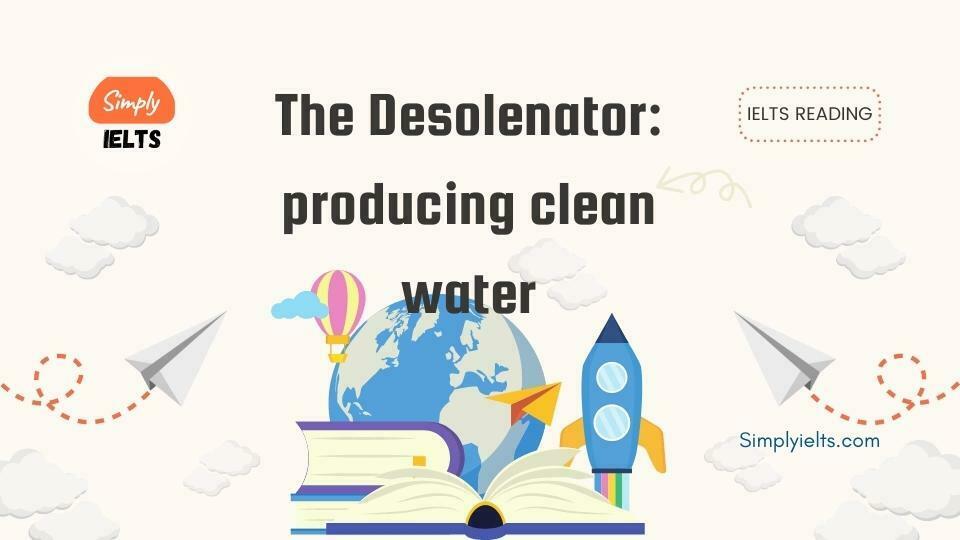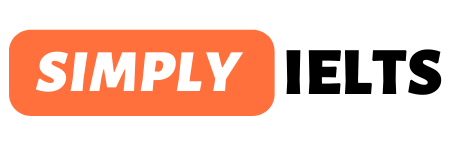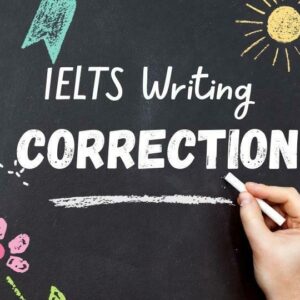The Desolenator: producing clean water IELTS reading test with answers and explanation
A new IELTS Reading Academic test passage 2 from Cambridge IELTS 15 Reading test 3 The Desolenator: producing clean water IELTS reading test with answers and location
In this IELTS Reading exam, you will find The Desolenator: producing clean water IELTS reading test answers with location and explanation

In the answers tab, you can find The Desolenator: producing clean water IELTS reading answers with location
The Desolenator: producing clean water IELTS reading test answers and explanation
READING PASSAGE 2
You should spend about 20 minutes on Questions 14-26 which are based on Reading Passage 2 below.
The Desolenator: producing clean water
A
Travelling around Thailand in the 1990s, William Janssen was impressed with the basic rooftop solar heating systems that were on many homes, where energy from the sun was absorbed by a plate and then used to heat water for domestic use. Two decades later Janssen developed that basic idea he saw in Southeast Asia into a portable device that uses the power from the sun to purify water.
B
The Desolenator operates as a mobile desalination unit that can take water from different places, such as the sea, rivers, boreholes and rain, and purify it for human consumption. It is particularly valuable in regions where natural groundwater reserves have been polluted, or where seawater is the only water source available.
Janssen saw that there was a need for a sustainable way to clean water is both the developing and the developed countries when he moved to the United Arab Emirates and saw large-scale water processing. ‘I was confronted with the enormous carbon footprint that the Gulf nations have because of all of the desalination that they do,’ he says.
C
The Desolenator can produce 15 litres of drinking water per day, enough to sustain a family for cooking and drinking. Its main selling point is that unlike standard desalination techniques, it doesn’t require a generated power supply: just sunlight. It measures 120 cm by 90 cm, and it easy to transport, thanks to its two wheels. Water enters through a pipe, and flows as a thin film between a sheet of double glazing and the surface of a solar panel, where it is heated by the sun. the warm water flows into a small boiler (heated by a solar-powered battery) where it is converted to steam. When the steam cools, it becomes distilled water. The device has a very simple filter to trap particles, and this can easily be shaken to remove them. There are two tubes for liquid coming out: one for the waste – salt from seawater, fluoride, etc. – and another for the distilled water. The performance of the unit is shown on an LCD screen and transmitted to the company which provides servicing when necessary.
D
A recent analysis found that at least two-thirds of the world’s population lives with severe water scarcity for at least a month every year. Janssen says that be 2030 half of the world’s population will be living with water stress – where the demand exceeds the supply over a certain period of time. ‘It is really important that a sustainable solution is brought to the market that is able to help these people,’ he says. Many countries ‘don’t have the money for desalination plants, which are very expensive to build. They don’t have the money to operate them, they are very maintenance intensive, and they don’t have the money to buy the diesel to run the desalination plants, so it is a really bad situation.’
E
The device is aimed at a wide variety of users – from homeowners in the developing world who do not have a constant supply of water to people living off the grid in rural parts of the US. The first commercial versions of the Desolenator are expected to be in operation in India early next year, after field tests are carried out. The market for the self-sufficient devices in developing countries is twofold – those who cannot afford the money for the device outright and pay through microfinance, and middle-income homes that can lease their own equipment. ‘People in India don’t pay for a fridge outright; they pay for it over six months. They would put the Desolenator on their roof and hook it up to their municipal supply and they would get very reliable drinking water on a daily basis,’ Janssen says. In the developed world, it is aimed at niche markets where tap water is unavailable – for camping, on boats, or for the military, for instance.
F
Prices will vary according to where it is bought. In the developing world, the price will depend on what deal aid organisations can negotiate. In developed countries, it is likely to come in at $1,000 (£685) a unit, said Janssen. ‘We are a venture with a social mission. We are aware that the product we have envisioned is mainly finding application in the developing world and humanitarian sector and that this is the way we will proceed. We do realise, though, that to be a viable company there is a bottom line to keep in mind,’ he says.
G
The company itself is based at Imperial College London, although Janssen, its chief executive, still lives in the UAE. It has raised £340,000 in funding so far. Within two years, he says, the company aims to be selling 1,000 units a month, mainly in the humanitarian field. They are expected to be sold in areas such as Australia, northern Chile, Peru, Texas and California.
Now start to answer “The Desolenator: producing clean water IELTS reading test” questions. You will have 20 minutes to answer questions 14 to 26.
.You can download answers as a pdf file from here:
Related articles:
- Changes in reading habits IELTS Reading test with answers
- How to make wise decisions IELTS reading answers
- Roman shipbuilding and navigation IELTS Reading answers
- The Step Pyramid of Djoser IELTS reading Answers
- Bird Migration Theory IELTS Listening answers
The Desolenator: producing clean water IELTS reading test Questions
click Finish exam to check the correct answers
The Desolenator: producing clean water IELTS Reading Answers
| Questions | Answers |
|---|---|
| 14 | iii |
| 15 | vi |
| 16 | v |
| 17 | x |
| 18 | iv |
| 19 | viii |
| 20 | i |
| 21 | wheels |
| 22 | film |
| 23 | filter |
| 24 | waste |
| 25 | performance |
| 26 | servicing |
The Desolenator: producing clean water IELTS Reading vocabulary with meaning
| Vocabulary | Example |
|---|---|
| initial/ɪˈnɪʃl/ | ( adj ). initial Ex: Her initial response was one of anger |
| inspiration/ˌɪnspəˈreɪʃn/ | ( noun ). Inspiration Ex: Dreams can be a rich source of inspiration for an artist |
| absorb/əbˈzɔːb/ | ( verb ). Absorb Ex: Plants absorb carbon dioxide from the air |
| domestic/dəˈmestɪk/ | ( adj ). familiar Ex: The vast majority of paid and unpaid domestic workers are women. Ex: domestic violence |
| portable/ˈpɔːtəbl/ | ( adj ). portable Ex: The equipment is lightweight, portable and easy to store |
| device/dɪˈvaɪs/ | ( noun ). device Ex: The new devices will be installed at US airports |
| purify/ˈpjʊərɪfaɪ/ | ( verb ). filter in, refine, make clean Ex: Plants help to purify the air |
| operate/ˈɒpəreɪt/ | ( verb ). Operate Ex: Solar panels can only operate in sunlight |
| desalination/ˌdiːˌsælɪˈneɪʃn/ | ( noun ). salt filter Ex: Desalination has become a viable option for the development of reliable fresh water supplies |
| consumption/kənˈsʌmpʃn/ | ( noun ). consumption Ex: Gas and oil consumption always increases in cold weather |
| especially/pəˈtɪkjələli/ | ( adv ). specifically Ex: Traffic is bad, especially in the city centre |
| valuable/ˈvæljuəbl/ | ( adj ). precious Ex: You should gain some valuable insights into the world of business |
| reserve/rɪˈzɜːv/ | ( noun ). reserves Ex: The country has the world’s largest reserves of coal |
| available/əˈveɪləbl/ | ( adj ). available Ex: We’ll send you a copy as soon as it becomes available |
| sustainable/səˈsteɪnəbl/ | ( adj ). Can be maintained for a long time; Environmental friendliness Ex: This type of farming is simply not sustainable any more |
| enormous/ɪˈnɔːməs/ | ( adj ). Huge Ex: Universities are under enormous pressure financially |
| carbon footprint/ˌkɑːbən fʊtprɪnt/ | ( noun ). carbon emissions Ex: Flying is the biggest contribution to my carbon footprint |
| alternative/ɔːlˈtɜːnətɪv/ | ( noun ). another choice Ex: The car is too expensive so we’re trying to find a cheaper alternative |
| sustain/səˈsteɪn/ | ( verb ). maintain, prolong Ex: Which planets can sustain life? |
| technique/tekˈniːk/ | ( noun ). Technical Ex: Researchers used advanced techniques to analyze the brain scans |
| require/rɪˈkwaɪər/ | ( verb ). need, require Ex: These pets require a lot of care and attention |
| generate/ˈdʒenəreɪt/ | ( verb ). create, emit Ex: We need someone to generate new ideas |
| supply/səˈplaɪ/ | ( noun ). supply Ex: Advances in agriculture increased the food supply |
| measure/ˈmeʒər/ | ( verb ). Measure Ex: Blood pressure and heart rate should be measured before treatment |
| distill/dɪˈstɪl/ | ( verb ). distillation Ex: Some strong alcoholic drinks such as whiskey are made by distilling |
| convert/kənˈvɜːt/ | ( verb ). Convert Ex: The hotel is going to be converted into a nursing home |
| particles/ˈpɑːtɪkl/ | ( noun ). crumbs, crumbs Ex: Dust particles must have got into the motor |
| transmit/trænzˈmɪt/ | ( verb ). transmission Ex: The disease cannot be transmitted through coughing or sneezing |
| flow/fləʊ/ | ( verb ). Run Ex: The river flows quite fast here |
| population/ˌpɒpjuˈleɪʃn/ | ( noun ). Population Ex:The country has a total population of 65 million |
| intensive/ɪnˈtensɪv/ | ( adj ). focused, intensive, powerful Ex: The course compresses two years’s training into six intensive months |
| off the grid/ɒf rɪd/ | ( adv ). do not use civil utilities (electricity, water, …) of the state Ex: You can produce your own power and live off the grid |
| carry out/ˈkæri aʊt/ | ( verb ). conduct Ex: The hospital is carrying out tests to find out what’s wrong with her |
| municipal/mjuːˈnɪsɪpl/ | ( adj ). (belonging to) city, municipality, town Ex: They are responsible for municipal leisure facilities |
| negotiate/nɪˈɡəʊʃieɪt/ | ( verb ). Overcoming (obstacles, difficulties…) Ex: The climbers had to negotiate a steep rock face |
| envision/ɪnˈvɪʒn/ | ( verb ). imagine, imagine Ex: They envision an equal society, free of poverty and disease |
| bottom line/ˌbɒtəm laɪn/ | ( noun ). Key point, crucial point Ex: The bottom line is that we have to make a decision today |
| sectors/ˈsektər/ | ( noun ). area Ex: We have seen rapid growth in the services sector |
| display/dɪˈspleɪ/ | ( verb ). Display Ex: She proudly displayed her certificate to her parents |





Responses